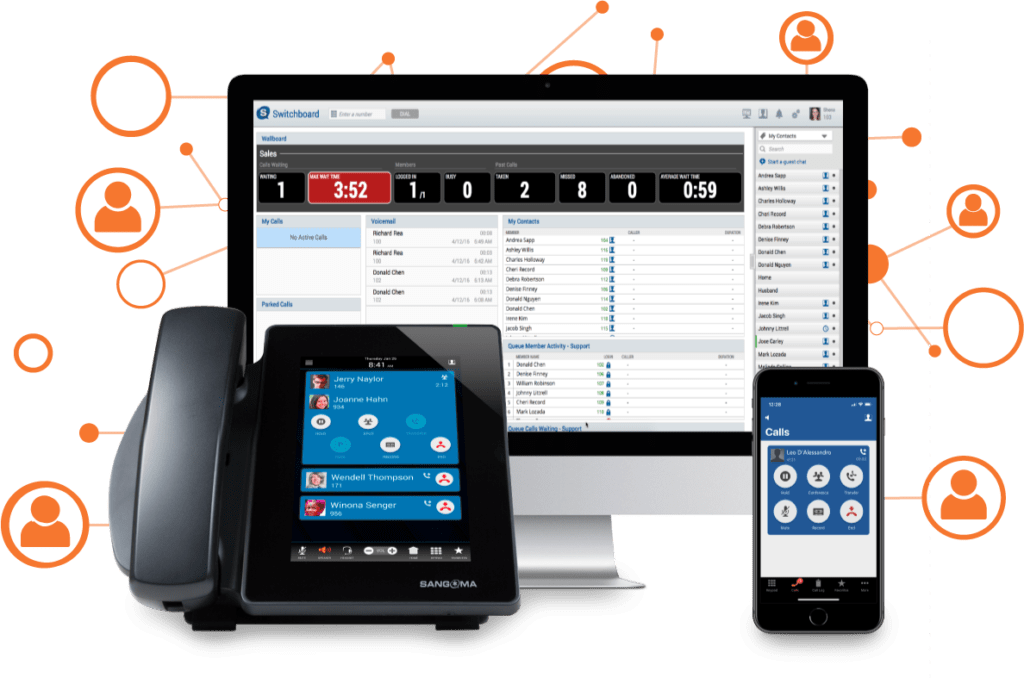The hottest technology on the market today for business and personal use is coming straight out of the VoIP and virtual phone sectors. Cloud-based VoIP technology lets you call from anywhere using a cell phone, computer, laptop, or desk phone using the same number.
Let’s look at what is a VoIP number and how you can get one. We’ll also discuss how to get VoIP services started and five VoIP fraud alerts that will protect your business. A VoIP number can also save you a ton of money that conventional landlines can’t.
What Is a Voice over IP Phone Number?
A VoIP number, also known as Voice over IP number, is a real telephone number assigned to a user, but not to a specific phone line. A virtual phone number is referred to as an extension, and it may have a Direct Inward Dial (DID) phone number accessible to the public.
Need some more context? Check out this quick two-minute video of Tony from Nextiva explaining VoIP phone numbers.
How Does VoIP Work?
How VoIP works by placing calls over the internet. Unlike traditional phone service, where calls must be routed through the local telephone company, VoIP phone service uses any broadband connection. With this method, VoIP routes a call along the most efficient path.
VoIP also extends to other forms of communication, like chat and text messaging. A business owner can select VoIP phone numbers for its staff, even if they work remotely.
With VoIP, a traditional phone line becomes obsolete for both business and residential use.
The Difference Between VoIP and Regular Phone Numbers
The mode of transmission between the two technologies is not the same. A VoIP phone number does not get assigned to a location, while a regular phone number does.
Also, the underlying technologies are dramatically different. A standard landline number travels through copper phone lines. A VoIP number utilizes data networks, such as the internet and internal enterprise LANs (Local Area Networks) to make calls.
How Do I Get a VoIP Number?
A VoIP phone service provider helps you get a VoIP number when you sign up for a VoIP service plan. Most plans are less expensive than a cellphone or regular telephone service.
As a result, you can lower your costs by up to 60% and access many more features that only VoIP can provide. 0x0 0x0
It’s likely you already have existing phone numbers. You can use them with VoIP. It’s your right to do so, backed by the Federal Communications Commission (FCC). You have the right to transfer your phone service to any carrier through a process known as number porting. You can port phone numbers from your cell phone, Google Voice, cable/telephone company, and even a competitive VoIP service provider.
You can select new numbers or use your existing ones. It’s up to you. Nextiva provides porting and setup at no extra charge on every plan. Nextiva’s business phone service plans start at $20/month.
How to Get VoIP Phone Service
If it’s time to switch over and get VoIP phone service, there are a handful of steps you’ll need to take to set up your virtual phone system. First, you must check and make sure you have a good internet connection.
You’ll then need to choose the VoIP subscription that fits your business needs, confirm your VoIP phone numbers, and select optional VoIP devices. Once that’s done, you can begin using your VoIP system on your computer or smartphone right away.
Why Should I Get a VoIP Number?
A VoIP phone system brings several advantages that conventional phone services cannot provide. You’ll find savings, greater flexibility, increased reliability, and crystal-clear call quality.
Lower Cost
Without the use of a phone line, VoIP numbers utilize your internet connection. Even with the monthly service, the expense is less than maintaining a traditional phone system.
You also get access to a ton of premium features included with the monthly rate. This includes all the favorite features your business needs, such as an auto-attendant, call queuing, intelligent call forwarding, and one-click conference calls. Plus, you can even get a toll-free VoIP number at no extra charge.
More Accessible
A VoIP phone system does not rely on a physical location to make calls. Its convenience comes from a stable internet connection. This makes communication possible across the country or halfway around the world.
VoIP itself doesn’t use a lot of bandwidth. Even a modest 10MB connection can handle 100 calls simultaneously. With the advances in LTE technology, you can use your smartphone to place and receive calls reliably.
Wired connections are best, but you should be quite satisfied when you have a strong Wi-Fi signal.
More Flexibility
A VoIP network has a vast amount of flexibility. When using a private, internal phone network, adding multiple phones to an existing system is limited. With a VoIP network, you are only limited by your bandwidth, which allows you to handle hundreds of calls using many popular broadband plans
Another way VoIP phones are flexible is their ability to operate with any device. They’ll work with computers, tablets, and VoIP phones. Most VoIP phones offer accessories to complement your workflow, such as corded or wireless headsets. If you have a traditional telephone, you can’t do without, you can always retrofit it with an Analog Telephone Adapter (ATA).
An ATA lets you use traditional telephone equipment on an all-digital VoIP network. Once you set it up, it just works.
Better Voice Quality
With a stable internet connection and high bandwidth, voice quality would be better than a traditional phone connection. How is this possible?
VoIP uses the latest sound compression technology known as “codecs” to digitally convert sound, eliminate fuzziness and static in the line, and send it over the internet. The G.722 codec has twice the bandwidth of an analog phone call, which means more clarity in every call. This is how VoIP delivers HD call quality.
In the rare moments of limited bandwidth, the call gracefully lowers to standard quality without any involvement on your part. It does it automatically. And if you call someone on the traditional phone system, the call will still sound great, but it might not be in full HD.
Multiple Devices
One of the best benefits is to use multiple devices on a single virtual number. With the VoIP number assigned to a person, not a location, they can take that number anywhere and access their account from any device.
Once they’ve logged in, they can use a personal or company laptop, computer, or cell phone that is VoIP compatible to make calls. These virtual numbers can also be set to forward calls to different telephone numbers if the user chooses.
Don’t forget that with VoIP, you can always configure the call routing any way you want. If you have a sales team you want to send incoming calls, all or some of their phones can ring at once.
The ability to use multiple devices with one telephone number gives the user the ultimate flexibility.
Read Related: pacman 30th anniversary



